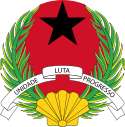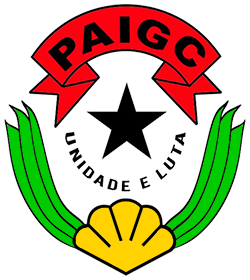 |
|---|
The Manifest Party of the People (Portuguese : Partido do Manifesto do Povo, PMP) is a political party in Guinea-Bissau.
 |
|---|
The Manifest Party of the People (Portuguese : Partido do Manifesto do Povo, PMP) is a political party in Guinea-Bissau.
The PMP was established in 2003 by Faustino Imbali. [1] The party received 0.8% of the vote in the 2004 parliamentary elections, failing to win a seat in the National People's Assembly. Imbali was the party's candidate for the 2005 presidential elections, but received just 0.52% of the vote, finishing tenth in a field of 13 candidates.
The party did not contest elections in 2008, 2009 or 2012, but returned to active politics when it ran in the 2014 parliamentary elections, receiving 0.7% of the vote and failing to win a seat. It received 0.1% of the vote in the 2019 and 2023 elections, remaining without parliamentary representation.

Kumba Ialá Embaló, also spelled Yalá, was a Bissau-Guinean politician who was president from 17 February 2000 until he was deposed in a bloodless military coup on 14 September 2003. He belonged to the Balanta ethnic group and was President of the Social Renewal Party (PRS). In 2008 he converted to Islam and took the name Mohamed Ialá Embaló. He was the founder of the Party for Social Renewal. In 2014, Ialá died from a cardiopulmonary arrest.

The African Party for the Independence of Guinea and Cape Verde is a political party in Guinea-Bissau. Originally formed to peacefully campaign for independence from Portugal, the party turned to armed conflict in the 1960s and was one of the belligerents in the Guinea-Bissau War of Independence. Towards the end of the war, the party established a socialist one-party state, which remained intact until multi-party democracy was introduced in the early 1990s. Although the party won the first multi-party elections in 1994, it was removed from power in the 1999–2000 elections. However, it returned to office after winning parliamentary elections in 2004 and presidential elections in 2005, since which it has remained the largest party in the National People's Assembly.

The African Party of Independence of Cape Verde is a democratic socialist political party in Cape Verde. It was formerly a Marxist–Leninist communist party and the sole legal party in the country from 1981 to 1990. Its members are nicknamed "os tambarinas" in Portuguese, and they identify themselves with the color yellow.

Elections in Guinea-Bissau take place within the framework of a multi-party democracy and a semi-presidential system. Both the President and the National People's Assembly are directly elected by voters.

The Workers' Party is a socialist political party in Guinea-Bissau.
The United Social Democratic Party is a centre-left social democratic political party in Guinea-Bissau.

The United Platform was a political alliance in Guinea-Bissau.

The Democratic Socialist Party was a political party in Guinea-Bissau.

The Union for Change is a political alliance in Guinea-Bissau.

The Resistance of Guinea-Bissau-Bafatá Movement is a political party in Guinea-Bissau. Once the main opposition organisation in the country, it is today a minor party without parliamentary representation.
The Party for Social Renewal is a political party in Guinea-Bissau. It is one of the country's leading parties and is currently the main opposition party.
This name uses Portuguese naming customs: the first or maternal family name is Ntchia and the second or paternal family name is Nhassé.

Aristides Gomes is a Bissau-Guinean politician who was the Prime Minister of Guinea-Bissau from 8 November 2019 until 28 February 2020. He previously served as Prime Minister from April 2018 to October 2019, and again from 2 November 2005 to 13 April 2007. He has subsequently served as President of the Republican Party for Independence and Development (PRID).

The Socialist Party of Guinea-Bissau is a political party in Guinea-Bissau.

The Guinean Democratic Movement is a political party in Guinea-Bissau.

The Guinean Civic Forum–Social Democracy is a political party in Guinea-Bissau.

Parliamentary elections were held in Guinea-Bissau on 16 November 2008. The result was a victory for the African Party for the Independence of Guinea and Cape Verde (PAIGC), which won 67 out of the 100 seats in the National People's Assembly, while the Party for Social Renewal (PRS) won 28 seats.

The Democratic Convergence Party is a political party in Guinea-Bissau.

The Guinean League for Ecological Protection is a political party in Guinea-Bissau.

The Social Democratic Party is a political party in Guinea-Bissau.